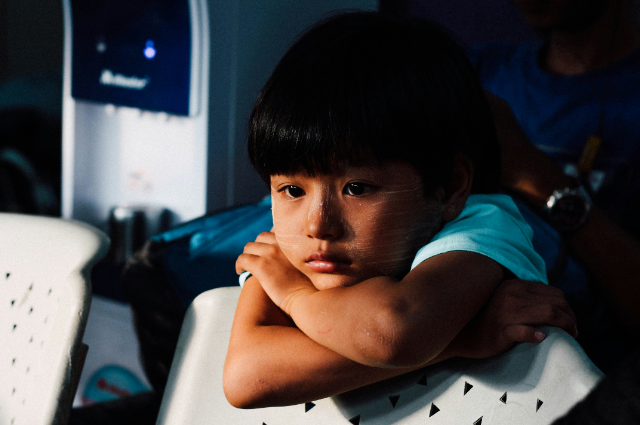
Photo by Chinh Le Duc on Unsplash / Representative Image
A 3.5-year-old child was assaulted by a 17-year-old boy and smashed her head with a stone for trying to resist his attack near Sirkazhi, Tamil Nadu. The crime itself was horrifying, but what followed was even more disturbing. The Mayiladuthurai District Collector, an IAS officer, justified the crime by stating that the child had "spat on the boy’s face earlier in the day," implying that this act led to the attack. This statement reflects the deep-rooted problem in our society—victim blaming, even when the victim is a toddler.
This incident isn't just about one officer's insensitive remark; it exposes the larger patriarchal mindset that continues to plague our society. Instead of demanding justice, we ask what the girl did wrong. Instead of questioning the criminal, we analyze the victim’s behavior. Even a 3-year-old is not seen as an innocent child but as a "girl" who should "stay in her limits."
When a Victim Is No Longer a Child but Just a "Girl"
When a society starts blaming a toddler for her own assault, it proves one thing—our culture sees women and girls as responsible for the crimes committed against them. A child spitting in anger is a normal reaction, yet an IAS officer linked it to the attack as if it was some sort of "punishment."
This mindset raises a dangerous question—if even a child is not considered innocent, then who is safe? This is the same logic used to blame teenage girls for wearing "modern clothes," working women for "coming home late," and married women for "not adjusting enough." It is the same system that tells women to be careful instead of teaching men to respect boundaries.
What Kind of Administration Are We Under?
When someone in power justifies a horrific crime, it sends a dangerous message—that justice is not guaranteed. If those responsible for protecting victims are the ones excusing crimes, how can we expect change?
An IAS officer is supposed to be a role model, a protector of the law. Yet, this statement reveals the urgent need for gender-sensitization training among government officials. How many more victims will be denied justice because those in power believe they "deserved" what happened to them?
The Role of Patriarchy in Normalizing Such Crimes
This is not an isolated case; it is a reflection of the patriarchal system that has existed for generations. A system that tells women to "adjust," "compromise," and "be careful" while making excuses for men. This is why parents worry constantly when raising daughters—because they know society will blame the girl instead of the criminal.
Victim-blaming emboldens criminals. When men see that society will always question the victim, they feel empowered to commit crimes without fear of consequences. This is why rape culture thrives—because we keep shifting the blame.
The Failure to Teach Boys About Consent and Respect
Why are we still raising boys with the idea that women are inferior? Why are we teaching them that anger, violence, and dominance are "masculine traits"? Instead of telling girls how to dress, where to go, and what to do, why aren’t we educating boys about respect and boundaries?
This is a parenting failure, an educational failure, and a societal failure. Boys are not born violent—they are shaped by their surroundings. And when we fail to teach them empathy and respect, they grow up believing that they can do whatever they want to women, without consequences.
Why Are Teens Committing Such Crimes?
The rise in crimes committed by teenagers is alarming. Why is this happening?
- Easy access to violent, misogynistic content online.
- Lack of proper sex education that teaches respect and boundaries.
- Parents ignoring what their children are watching and consuming online.
- A culture that normalizes aggression in boys while suppressing their emotions.
Teenagers are growing up with toxic influences, and without proper guidance, they begin to see violence as normal behavior. This is a wake-up call for parents to monitor what their children are learning—from social media, from peers, and even from their own homes.
Parenting in the Digital Age: The Need for Supervision
Parents need to take responsibility for shaping their sons' values. Raising a child isn’t just about providing food and education—it’s about teaching them the right way to treat others.
- Talk to your sons about consent and respect.
- Monitor what they watch, read, and consume online.
- Teach them emotional intelligence so they don’t resort to violence.
- Show them that being "manly" doesn’t mean being dominant or aggressive.
Children mirror what they see. If parents don't actively teach them respect, they will learn from the worst influences around them.
Conclusion: It’s Time to Shift the Focus
We need to stop blaming victims and start holding criminals accountable. We need to stop raising girls in fear and start raising boys with responsibility. We need to demand better from those in power and reject any justification for crimes against women and children.
The Sirkazhi case is a horrifying reminder that patriarchal mindsets are still deeply ingrained in our society. But change is possible—if we start teaching respect at home, demanding accountability from authorities, and rejecting victim-blaming in every form.
Justice is not about asking, "What did she do?" It’s about asking, "Why did he think he could do this?" Until we shift this perspective, we will continue to fail our daughters.
